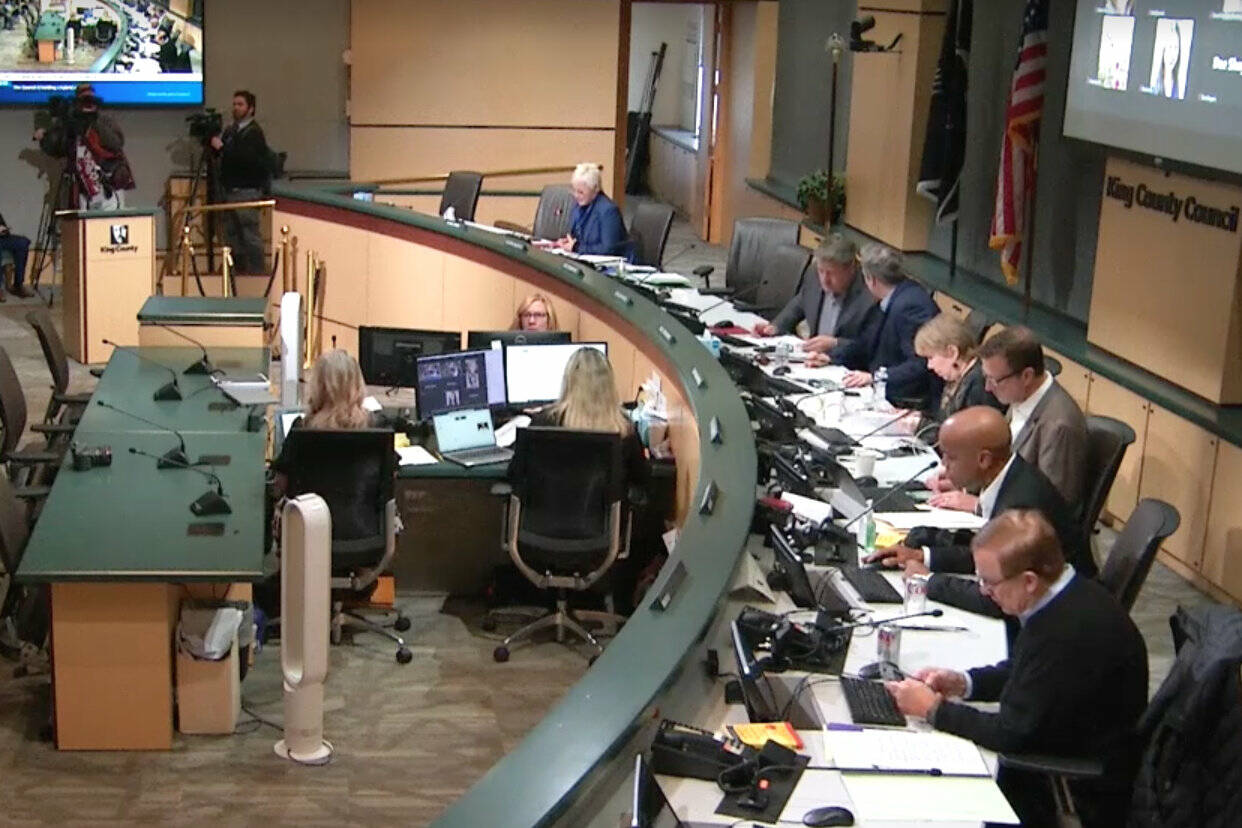Correction: The Courier-Herald originally misreported the number of King County councilmembers — there are nine, not seven. The article has been updated.
The King County Council may soon approve a $20.29 minimum wage for unincorporated areas.
The vote on the ordinance is expected on Tuesday, May 14, and with five of the nine council members having expressed public support for the measure, it’s expected to pass.
However, Councilmember Reagan Dunn — who represents not just District 9 in King County (which includes Enumclaw), but one of the largest swaths of unincorporated land in the county — plans to introduce some amendments that could mitigate the effect on some employers.
Washington’s minimum wage is $16.28; if King County passes this legislation, it would be tied with Tukwila for the highest in the state.
However, the full effect of this ordinance would only begin immediately for businesses with 500 or more employees on Jan. 1, 2025.
Smaller businesses could increase their wages more slowly. Businesses with more than 15 employees (but fewer than 500) will have to start paying an $18.29 minimum wage, and businesses with 15 employees or less and make less than $2 million in gross revenue can start off with a $17.29 minimum wage. These wages will increase incrementally until 2030, when all businesses will pay the new minimum wage plus inflation adjustments.
A $20.29 minimum wage could bring workers closer to what’s called a “living wage” for the King County, based on a number of factors like housing costs, utilities, childcare, etc., to both meet basic needs and be self-sufficient. According to the Living Wage Calculator, run by the Massachusetts Institute of Technology, a family of two working adults with two children would both have to make just over $36 to meet the living wage standard.
King County notes that 23% of all households earn less than the state minimum wage (according to the 2021 census). However, about 42% of Indigenous households make less than the state minimum wage, and 46% for Black households.
The next council meeting is on May 14 at 1:30 p.m. To submit a public comment, email clerk.council@kingcounty.gov by 10 a.m. on the meeting day and include the topic and related agenda item in the subject line.
You can also attend the meeting remotely using Zoom (webinar ID 890 5838 1493) or call 1-253-215-8782 (and use the webinar ID), or attend the meeting in person at 516 3rd Avenue, Room 1001.
LOCAL EFFECTS
According to the Puget Sound Regional Council, there are about 4,100 businesses that would be affected by this new minimum wage.
This includes Enumclaw dairy farmer Leann Krainick, who has said this ordinance would greatly affect her business, because the price of her milk is set by the Federal Milk Marketing Orders and can’t be unilaterally raised. Additionally, the farm can’t cut its production because it’s locked in with a contract with Darigold.
She added that many of her employees already make close to $20 an hour, but with the minimum wage bump, she’ll also have to give her more experienced employees a raise.
All of this means she expects to have to let her lower-level employees go and find ways to be more efficient to mitigate this new cost.
“And this isn’t [just] us,” she said. “I’m hearing this all over.”
Krainick added that it’s unclear how seasonal farmers will be affected by this ordinance, as they could have less than 15 employees for most of the year, but have to hire more than 15 during harvest season.
Farmers aren’t the only ones worried about how this will affect their business.
“We couldn’t afford that. We’d have to raise prices, then people will complain about prices going up,” said Lori Morin, manager of the local staple Krain Corner. “It sounds horrible… it’s just going to cause a hardship all around.”
PROPOSED AMENDMENTS
Dunn has been vocal about this measure being not only partisan, but that the other elected officials that support it don’t represent any of rural areas that it’ll affect.
“You’ve got laws being made… by people that have few, if any, unincorporated residents in their district, that’s sponsored by downtown Seattle uber-progressive/socialist politicians,” he said. “… It’s a little bit like taxation without representation.”
With the measure likely to pass, Dunn has focused his efforts on delaying the vote (it was scheduled for May 7, but was moved to next week) to allow for more public comment and amend the ordinance to include “total compensation” with the wage increase.
In short, total compensation means everything an employer offers its workers, from wages to retirement plans and paid time off; Dunn’s amendment would mean that tips, gratuities, bonuses, and money paid by employers toward a worker’s health benefit plan to be a part of the new hourly wage.
Councilmember Sarah Perry of District 3, who also represents a robust farming community and effectively the rest of unincorporated King County (minus Vashon Island), is also seeking some amendments.
Currently, the ordinance requires King County to talk with members of the agricultural community about the difficulties they face and how the county can mitigate them; that report is to be due by the end of September. However, Perry’s amendment would push the due date back to June 2025 in order to have the most data possible.
Additionally, the current ordinance currently includes the possibility of an exemption for the minimum wage increase for agricultural businesses; Perry’s second amendment would remove that section.
She said that in general, most farmers she’s talked to already pay their employees close to or more than the proposed minimum wage, and that their financial issues come from elsewhere — high capital costs and losing the COVID-era American Rescue Plan funding being just two. Thus, carving out an exemption for them would be moot, and wouldn’t help them in the ways they need it.


